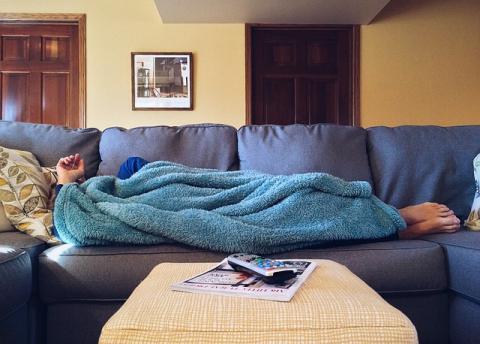
Anxiety and stress are commonplace in the world today. More and more people have experienced the debilitating effects of anxiety and face sudden interruptions to their daily lives.
Several people have turned to medications to cope.
However, anxiety medications don't work equally for everyone and can have intimidating side effects.
Fortunately, medications aren't the only solution. Developing personalized coping methods is a more sustainable and low-risk way to combat anxiety.
1. BREATHE
There's a reason why breathing might be the most common advice for anxiety and panic attacks.
And that reason is grounded in science.
Breathing deeply from your diaphragm, or belly breathing, slows your heartbeat and can lower blood pressure. It allows you to receive more oxygen and keep the CO2 levels in your body balanced.
On the other hand, shallow breathing limits your diaphragm movement. Most of the time, oxygen doesn't fully reach or fill the bottom of your lungs, meaning you're not getting as much oxygen as you could.
The American Institute of Stress recommends 20 to 30 minutes of deep breathing every day to combat anxiety and stress. Keeping up a consistent breathing practice helps keep your anxiety at manageable levels.
Anxiety produces a fight-or-flight response in the sympathetic nervous system, but breathing deeply from your diaphragm activates the parasympathetic nervous system, which is responsible for feelings of calm and relaxation.
To try deep breathing, follow these steps:
- Breathe in through your nose slowly for 4 to 6 seconds.
- Hold your breath for 3 seconds.
- Breathe out through your mouth slowly for 7 to 9 seconds.
- Repeat at least ten times.
Deep breathing prevents you from hyperventilating and has long been used in meditation to quiet the mind. Yoga, too, acknowledges the significance of breath in its practice.
2. ACCEPT YOUR ANXIETY
This second tip might sound counterintuitive, but let's face it: anxiety is a counterintuitive emotion.
The more you focus on anxiety, the stronger and longer it seems to last. The guilt and shame you might feel about your anxiety will only make it worse.
But these feelings are unnecessary. Regardless of how they appear, everyone struggles with anxiety at some point. It's a natural emotion for everyone, and it's a natural emotion for you.
Give yourself permission to feel anxious. Seriously, try it.
Now let's make one distinction. Acknowledging anxiety as normal doesn't mean you're giving in to it.
You will NOT be anxious forever, and it will NOT control your life.
Instead, you need to develop a set of coping strategies, which allow you to manage anxiety when it does occur.
3. LOOK AT YOUR THOUGHTS FROM AN OBJECTIVE STANDPOINT
For this exercise, think of yourself as a third party: someone who is merely an observer. That person is going to keep a record of your thoughts.
This step is about understanding your anxiety and uncovering some of its causes. The key is to leave out any judgment about your thoughts or feelings.
Sit quietly with yourself and notice your thoughts and feelings. All you need to do is observe. Note how you feel and what made you feel that way.
Are you anxious about a social gathering? What is it that makes you feel nervous? You might be able to list several things:
- It's my first time going to that part of town.
- I won't know most of the people there.
- I haven't been out in a while.
Being able to identify these causes is progress. Don't let yourself drift into judgment, with thoughts like "I should get out more," "I'm so unadventurous," or "I can't believe I'm anxious about this." Those aren't facts, and an objective observer couldn't make those judgments.
You might find that the reasons for your anxiety are actually quite minor and you can address them through simple steps. If you're anxious about visiting a new part of town, you can look up the address in advance and familiarize yourself with the route you'll take.
4. QUESTION YOUR THOUGHTS
Use that anxious energy to scrutinize your mind, not your entire person or self-worth.
We're not logical when we're anxious, and our thoughts aren't trustworthy. Your process of reflection may be overdramatic, greatly exaggerated, or even flat out false.
Often people who have panic attacks confuse them for heart attacks. The mental effects of a panic attack are so strong that the feelings are similar to a heart attack, even though there is no immediate physical danger to your person. That's how distorted your thoughts can be.
However, when you're feeling intense anxiety or an impending panic attack, you can use a line of questioning to bring your escalating feelings back down to earth.
Ask yourself:
- Is this thought realistic?
- How likely is it to happen?
- What is the worst that could realistically happen?
- Could I deal with that situation?
- How would I deal with that situation?
- How can I prepare for this possibility?
5. DON'T BE ASHAMED TO LOOK FOR A DISTRACTION
We've already established that the more you focus on anxiety, the more it tends to stay and get stronger. While many strategies combat anxiety head on, there's no shame in seeking out a distraction, especially a healthy one.
Try doing the same activities you enjoy when you're not anxious. Working on a task that is meaningful and has a clear goal can keep you from obsessing about how you feel.
You know what relaxes you on a non-anxious day, so seek out these activities when you're anxious. You might take a long bath and add a few drops of your favorite essential oil. Maybe you have a go-to album or artist you love to play on repeat.
Do what you know works for you.
6. TRY EXERCISE
Most of us struggle to get to the gym, but that isn't the only way to exercise. And there's more to exercise than losing weight.
Anxiety releases stress hormones like adrenaline into the bloodstream. Even light exercise like going for a brisk walk is a productive way to use that adrenaline. You might find that you have more energy for a workout when your nerves are high.
Exercise helps with your breathing by forcing you to use your maximum lung capacity. It releases tension and tires your muscles. It's also an excellent way to distract yourself from anxious thoughts.
Anxiety sometimes prevents us from doing the things we love. But it's also an unavoidable part of life. Accepting your fear as natural, doing some productive reflection, and finding outlets to release your body's accumulated tensions are just some of the steps you can take to managing the beast.








